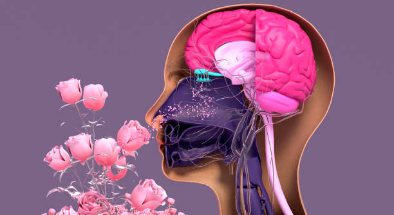New research shows steep drops in the rates of smell loss with recent omicron variants
By Aara’L Yarber August 2023
When the pandemic began, losing your sense of smell was considered a key indicator of covid-19, and the condition affected about half of those who tested positive for the coronavirus. However, a new study reveals that the chance of smell loss from the latest omicron variants has dropped dramatically since the early days of the pandemic.
“So now, three people out of 100 getting covid presumably may lose their sense of smell, which is far, far less than it was before,” said study leader Evan Reiter, the medical director of Virginia Commonwealth University Health’s Smell and Taste Disorders Center.
The findings, published in the journal Otolaryngology — Head and Neck Surgery, mean that losing smell and, by association, your sense of taste is no longer a reliable sign that someone has a covid infection, Reiter said.
“Now, the chance of you having [smell loss from] covid as opposed to another virus, like different cold and flu bugs, is about the same,” he said.
Although it is unclear why the frequency of smell loss has decreased over time, vaccinations and preexisting immunity could be playing a role, the researchers said.
Doctors have had difficulty explaining the cause of smell loss, but some research suggests it is due to covid triggering a prolonged immune assault on olfactory nerve cells. These cells sit at the top of the nasal cavity and help send smell signals from the nose to the brain.
It is possible that over time this attack causesa decline in the number of olfactory cells. But if you’ve already been infected or vaccinated, the time the virus has to inflict this kind of damage is dramatically reduced, said Benjamin tenOever, a professor of microbiology and medicine at New York University who was not involved in the study.
Smell loss is still taking a toll
To determine the frequency of smell and taste loss throughout the pandemic, researchers accessed a national database of more than 7 million patients who tested positive for the coronavirus from April 2020 to October 2022. Using the early 2020 levels as a baseline, they calculated the relative risk of smell and taste loss during peak infection periods for eachvariant wave.
The study found the risks of smell and taste loss for alpha and delta, two of the most widespread coronavirus variants in 2021, had already declined compared to the first pandemic wave, dropping on the order of 37 percent for alpha and 32 percent for delta. When omicron variants were dominant in 2022 and early 2023, the risk of smell loss plummeted to as low as3 percent of positive covid cases.
Despite the dramatic decline, Reiter said he still sees patients who have either completely lost or have a distorted sense of smell, which takes a significant toll on their quality of life.
“By and large, the biggest complaint people will have with any kind of distortion or loss of their sense of smell is that food doesn’t taste the same,” Reiter said. This is because your taste buds tell you if the food is sweet, sour, bitter or salty, but your nose tells you the specifics from the odors you inhale, such as if you’re eating an apple or a pear.
People with a distorted sense of smell, known as parosmia, may find that the foods they once liked taste and smell revolting.
